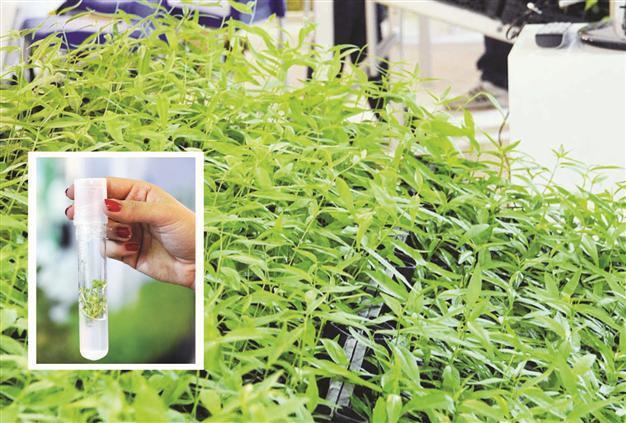Rootstocks produced by cloning in Turkey
ISTANBUL - Anatolia News Agency

The healthiest root on a rootstock was cleared of bacteria in the company’s laboratory and then planted in a special tube with a specific atmosphere. AA Photos
A million-dollar investment by an Istanbul-based company created a domestic
rootstock laboratory that supplies both domestic and foreign agriculture companies. The company’s general director, Yusuf Atilla Üstün, said the company was a subsidiary of a heating systems company.
He said the heating systems company had decided to enter the agricultural sector and purchased thousands of square meters of land. When the company tried to plant large orchards it could not find healthy and high-quality young plants, so established a subsidiary company.
”Our company, which was established in 2009, has carried out comprehensive research in the country. Fruit tree rootstocks are not known in the country; their variety is not known. Turkey imports nearly 5 million fruit scion annually. Rootstocks of apricot, plum, cherry and almond trees are imported by big companies. We filled a gap in this field,” Üstün said. He said developed countries around the world focused on this issue and began developing rootstocks that would yield products within a short time, which was possible with the cloning process.
“As a result of years-long efforts around the world, rootstocks of fruits like apricot, plum and pear have been determined. Millions of young plants can be produced from these fruits through the cloning method. Plant tissue culture becomes a part of this process and serial production starts.”
Just like premature babies in incubators He said the healthiest root on a rootstock was cleared of bacteria in a laboratory environment and then planted in a special tube with a specific atmosphere. The whole process is done in a sterile environment to keep the rootstocks from catching any disease. “We cut and reproduce plants in a very clean environment. They are like premature babies in incubators.” The company creates three to five young plants every 20 to 30 days, he added.
The rootstocks are planted in special greeneries and reach 15 to 20 centimeters in 20 to 30 days. Üstün said the period of adjusting to nature was very important and that all the conditions should be controlled before the plant was ready for planting.
Üstün said rootstocks were developed abroad. “Each of them is secured by a patent. We pay 17 cents to the supplier company for each young plant that we produce. It is also upsetting that 80 percent of gene pools used for this production exist in Turkey, too. But development and improvement work is done abroad.”
Üstün said their company was the most comprehensive one in Turkey, producing 6,000 rootstocks yearly, but could produce up to 20 million rootstocks in six months if there was demand and would produce to meet the country’s needs.
“We want to put an end to importation. We have produced 1 million orders for a company in the Netherlands, which is the father of this business. We will also send 800,000 rootstocks to a French company,” he said.
orchad,
